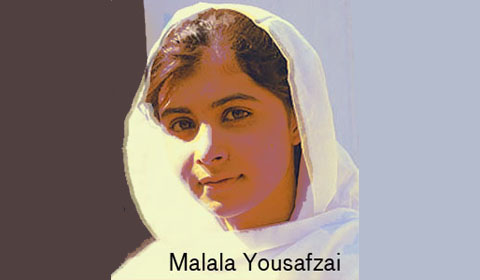
In Pakistan’s Swat Valley, Oct. 9, 2012 began as just any other day for 15-year-old Malala Yousafzai. She ate breakfast with her family, playfully bantered with her younger brother, Atal, and went off to school with her friends, hoping to do well on a Pakistan Studies exam. The exam came and went, and eventually Yousafzai and her fellow classmates boarded the dyna — the equivalent of a small school bus — to go home. Though she noticed that the often busy streets were uncharacteristically devoid of other people, Yousafzai was preoccupied by the essay she had to revise that night and did not dwell on the fact that the streets were empty. Still wrapped up in thoughts about her essay, she did not react when two men ordered the dyna to stop and then came inside asking, “Who is Malala?” Then, everything went black as Yousafzai lost consciousness.
This year, through the Los Angeles-based organization Girls Learn International, Marlborough School entered a partnership with Yousafzai’s old school in Pakistan, Khushal Girls High School and College. Students in the Girls Go Global club at Marlborough began video chatting with girls at Khushal in early November and will hold a fundraiser for them in the second semester.
“Maybe through contact with that school we will be able to find out more about the circumstances surrounding Malala and her life there in Pakistan…You know, it’s just a neat connection even if it is not directly with Malala,” History and Social Sciences Department Head Catherine Atwell said.
Beginning in 2009, Yousafzai committed herself to furthering women’s education in Pakistan. This made her a target for the Taliban, an insurgent group active in the Swat Valley since the early 1990s, that is committed to enforcing a fundamentalist interpretation of Sharia law, including thwarting female education. During the Oct. 9 attack, Yousafzai, along with two of her classmates, was shot by two members of the Taliban. Having taken a bullet to the head, she was flown to the United Kingdom’s Queen Elizabeth Hospital for treatment. She eventually regained consciousness on Oct. 16 2012.
In the year since the attack, Yousafzai has continued to spread the word about the importance of women’s education from Britain. She was recently honored for her work with an audience from Queen Elizabeth II and a nomination for the Nobel Peace Prize. Yousafzai has also spoken at the United Nations several times since being released from Queen Elizabeth Hospital on Feb. 8, including to mark the anniversary of the UN’s Global Education First Initiative (GEFI) program. At the GEFI event, she reportedly said, “Instead of sending tanks [to Afghanistan], send pens. Instead of sending soldiers, send teachers. This is the only way that we can fight for education.”
“I think working for educational rights is always a really amazing thing to do and I really respect the effort she’s put into it,” Lauren ’15 said.
Education was always a large component of Yousafzai’s life. Her father, Ziauddin Yousafzai, doubled as the head of her school and was a major proponent of female education. In a BBC interview with Andrew Marr, Yousafzai summed up her platform using a statement that her father used to tell her: Education is neither eastern nor western, education is education. It is the right of everyone.
“The courage that she displayed was remarkable, standing up for what she believed in at great personal risk. And in that society being a girl and being an outspoken advocate are not usually two things we see in the same sentence, which is a shame,” Atwell said.











